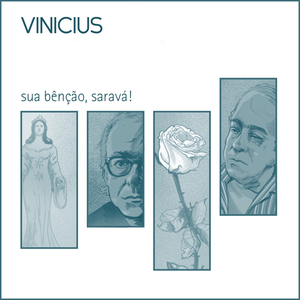Meu Pai Oxalá
Moinho Lyrics
Jump to: Overall Meaning ↴ Line by Line Meaning ↴
Atotф, babб
Atotф, abaluaiк
Atotф, babб
Vem das бguas de Oxalб
Essa mбgoa que me dб
Ela parecia o dia
Linda no seu manto
Todo branco
Em meio а procissгo
E eu
Que ela nem via
Ao Deus pedia amor
E proteзгo
(2x):
Meu pai Oxalб
Й o rei
Venha me valer
Meu pai Oxalб
Й o rei
Venha me valer
O velho Omulu
Atotф, abaluaiк
O velho Omulu
Atotф, abaluaiк
Que vontade de chorar
No terreiro de Oxalб
Quando eu dei
Com a minha ingrata
Que era filha de Iansг
Com a sua espada
Cor-de-prata
Em meio а multidгo
Cercando Xangф
Num balanceio
Cheio de paixгo
(2x):
Meu pai Oxalб
Й o rei
Venha me valer
Meu pai Oxalб
Й o rei
Venha me valer
O velho Omulu
Atotф, abaluaiк
O velho Omulu
Atotф, abaluaiк
Atotф, abaluaiк
Atotф, babб
Atotф, abaluaiк
Atotф, babб
"Meu Pai Oxalá" by Moinho is a song that delves into the Afro-Brazilian spirituality, specifically the Yoruba religion. The song starts with a chant of "Atotф, abaluaiк,/ Atotф, babб" which is an invocation to the orixá Omulu (also known as Obaluaiê), who is regarded as the deity of healing and sickness. The repetition of the chant is meant to draw attention to the importance of Omulu in the singer's life.
The next verse talks about the singer's sadness that seems to have originated from the waters of Oxalá, another orixá known as the father of all orixás. The singer describes a beautiful woman in white who seems to symbolize hope in the midst of darkness. The singer prays to the gods for love and protection but feels as though the woman does not see or recognize his existence.
The chorus continuously repeats the plea to "Meu Pai Oxalá," who is regarded as the king and father of all orixás, to come to their rescue. The last verse describes a moment in the "terreiro" or sacred space of Oxalá where the singer confronts their ungrateful partner, who is identified as the daughter of Iansã, another orixá associated with thunder and lightning. The singer describes a silver sword that symbolizes the power of Xangô, the orixá of justice, as it sways during the confrontation.
Overall, the song is a powerful representation of the spirituality and cultural identity of the Afro-Brazilian people. It emphasizes the importance of the orixás and their ability to provide guidance and protection in times of need.
Line by Line Meaning
Atotф, abaluaiк
Repetitive chant invoking the spirits of the Yoruba pantheon
Atotф, babб
Repetitive chant invoking the spirits of the Yoruba pantheon
Vem das бguas de Oxalб
This feeling of sadness comes from the influence of Oxalá, the deity of purity and wisdom that rules over fresh water and white orchids
Essa mбgoa que me dб
This emotional pain that I feel
Ela parecia o dia
She was as bright as the morning sun
A romper da escuridгo
Breaking through the darkness
Linda no seu manto
Beautiful in her ceremonial dress
Todo branco
Pure white color symbolizing Oxalá's purity
Em meio а procissгo
In the middle of the religious procession
E eu
And I, unnoticed
Que ela nem via
That she didn't even notice
Ao Deus pedia amor
Praying to God for love
E proteзгo
And protection
(2x):
Meu pai Oxalб
Й o rei
Venha me valer
Meu pai Oxalб
Й o rei
Venha me valer
Repetitive chant asking for help and protection from Oxalá, the king and the wisest of all Yoruba deities
O velho Omulu
Omulu, the old man
Que vontade de chorar
The urge to cry
No terreiro de Oxalб
In the yard of the Oxalá's temple
Quando eu dei
When I realized
Com a minha ingrata
That my lover had betrayed me
Que era filha de Iansг
That she was a daughter of Iansã, the Yoruba goddess of wind, storms, and lightning
Com a sua espada
Bringing her sword
Cor-de-prata
Silver-colored, representing justice
Em meio а multidгo
In the middle of the crowd
Cercando Xangф
Surrounding Shango, the Yoruba god of thunder and fire
Num balanceio
In a dance
Cheio de paixгo
Full of passion
(2x):
Meu pai Oxalб
Й o rei
Venha me valer
Meu pai Oxalб
Й o rei
Venha me valer
Repetitive chant asking for help and protection from Oxalá, the king and the wisest of all Yoruba deities
O velho Omulu
Omulu, the old man
Atotф, abaluaiк
Repetitive chant invoking the spirits of the Yoruba pantheon
Atotф, babб
Repetitive chant invoking the spirits of the Yoruba pantheon
Atotф, abaluaiк
Repetitive chant invoking the spirits of the Yoruba pantheon
Atotф, babб
Repetitive chant invoking the spirits of the Yoruba pantheon
Contributed by Anna B. Suggest a correction in the comments below.

Jorge Sardinha
Linda voz perfeito parabéns!
SALVE A SAGRADA UMBANDA!
(Anápolis-GO )
Edina Roggero
E muito lindo, da uma vibração maravilhosa
Edgard A Yoshida
Linda mulher a Emmanuelle Araújo! E talentosa também!!!
Wallacy Fidelis
CANTA MUITO!!! 😍😍 EMANUELLY LINDA❤
Rosa Viviane e Vanessa Benevides
Lindo demais !!!!
Ana Mel Magalhães
Linda canção de Vinícius, que nos emociona na voz de Emanuela. Valeu mana.
maria celia mendes marques
Emmanuelle esconde o talento que Deus lhe deu. era para estar cantando e fazendo muito sucesso. é linda e canta divinamente 👏👏👏👏👏👏👏👏👏👏
Anelise
Lindoooooo🥰💚💚💚💟
João Francisco
Artiicialissima
telma Figueiredo
Atotô meu pai